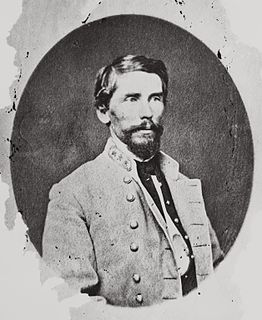A Quote by Lysander Spooner
It is perfectly clear, in the first place, that the constitution of the United States did not, of itself, create or establish slavery as a new institution; or even give any authority to the state governments to establish it as a new institution. The greatest sticklers for slavery do not claim this.
Related Quotes
Abolish slavery tomorrow, and not a sentence or syllable of the Constitution need be altered. It was purposely so framed as to give no claim, no sanction to the claim, of property in man. If in its origin slavery had any relation to the government, it was only as the scaffolding to the magnificent structure, to be removed as soon as the building was completed.
Adrian Rogers told us as often as he could he took the Bible literally. He illustrated by saying he believed the world was created in six 24-hour days. And he repeated this to make an impression upon us. In private (Jerry Vines was with us), I asked Rogers what he did with the slavery passages of the New Testament. Did he take them literally? He paused and said, 'Well, I believe slavery is a much-maligned institution. If we had slavery today, we would not have this welfare mess.'
The Constitution does not protect the sovereignty of States for the benefit of the States or state governments as abstract political entities, or even for the benefit of the public officials governing the States. To the contrary, the Constitution divides authority between federal and state governments for the protection of individuals.
The Constitution, when it says, "We, the people of the United States, in order to form a more perfect union, establish justice, ensure domestic tranquility, provide for the common defense, promote the general welfare, and secure the blessings of liberty to ourselves and our posterity, do ordain and establish this Constitution for the United States of America," meant just what it said without reference to color or condition, ad infinitum.
We the People of the United States, in Order to form a more perfect Union, establish Justice, insure domestic Tranquility, provide for the common defense, promote the general Welfare, and secure the Blessings of Liberty to ourselves and our Posterity, do ordain and establish this Constitution for the United States of America.
The inconsistency of the institution of domestic slavery with the principles of the Declaration of Independence was seen and lamented . . . no insincerity or hypocrisy can be fairly laid to their charge. Never from their lips was heard one syllable of attempt to justify the institution of slavery. They universally considered it as a reproach fastened upon them by the unnatural step-mother country and they saw that before the principles of the Declaration of Independence slavery, in common with every other mode of oppression, was destined sooner or later to be banished from the earth.
It is said slavery is all we are fighting for, and if we give it up we give up all. Even if this were true, which we deny, slavery is not all our enemies are fighting for. It is merely the pretense to establish sectional superiority and a more centralized form of government, and to deprive us of our rights and liberties.
I hold it to be a paramount duty of us in the free states, due to the Union of the states, and perhaps to liberty itself (paradox though it may seem) to let the slavery of the other states alone; while, on the other hand, I hold it to be equally clear, that we should never knowingly lend ourselves directly or indirectly, to prevent that slavery from dying a natural death--to find new places for it to live in, when it can no longer exist in the old.
The United Nations is the preeminent institution of multilateralism. It provides a forum where sovereign states can come together to share burdens, address common problems, and seize common opportunities. The U.N. helps establish the norms that many countries - including the United States - would like everyone to live by.
The forefathers of the United States were children of religious bigotry and persecution, and, as a result, fled Britain to create a new approach to life and government. They valued intellect and education. In fact, they outlined the principles of the United States' democracy to establish intellectual freedom from the Church.








































